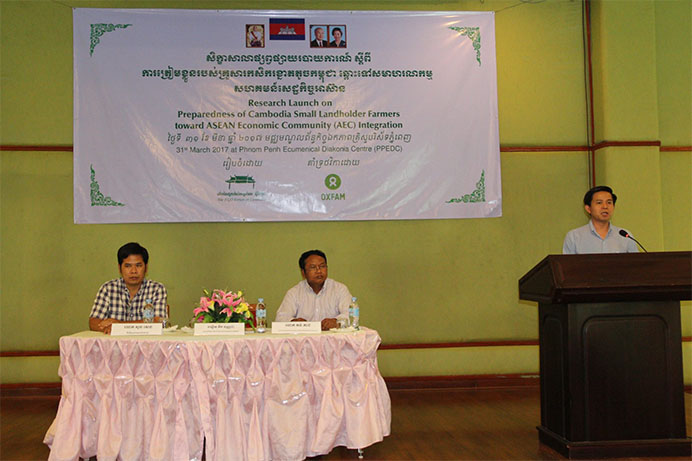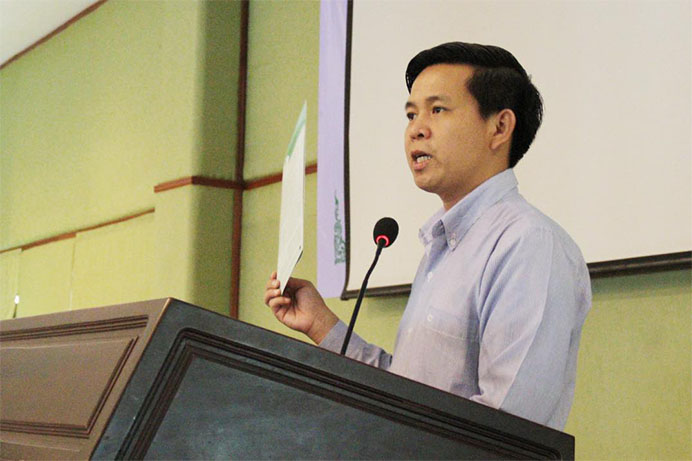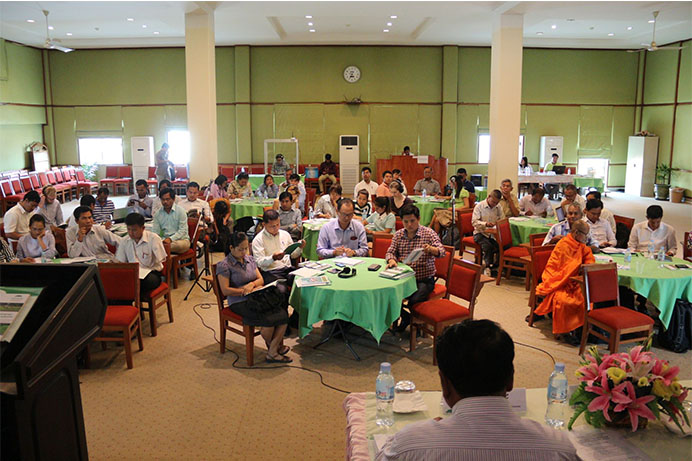
On 31 March 2017: The NGO Forum on Cambodia through its Agriculture Policies Monitoring Project to organize research launching on preparedness of Cambodia small landholder farmers toward ASEAN economic community (AEC) integration at Phnom Penh Ecumenical Diakonia Centre (PPEDC) with around 62 participants (12 women) join the event. The research report aims to identify roles, challenges and opportunities of Cambodia small landholder farmers. The study will raise the policy recommendations for supporting small landholder farmers both man and woman farmers on how to be well positioned in competition with other ASEAN member countries to protect the Cambodia agriculture for its food security and food sovereignty, as well as in the purpose to inform the policy makers and decision makers.

Dr. Tek Vannara mentioned that ASEAN has been integrated since 2015 and Cambodia is one of ASEAN members. Both opportunities and challenges might occur in Cambodia. For example, Cambodia has become a medium-income so Official Development Assistance (ODA) can be reduced. Low interest rate for Cambodian’s loan also has been addressed and discussed by the government at the national level in order to find ways to support small landholder farmers who accessing micro-finance loan for agricultural purpose.
Mr. Kong Pheach, MAFF responded that Farmer Association is a very important mechanism for farmers to integrate into ASEAN. The first thing that farmers should do is to register for contract farming. Then, the government will assist to deal the issue that famers have faced with. Both raw-material suppliers and final producers are important to work together. He added that related to importing, we cannot stop the flow of products to our country as Cambodia already registered to World Trade Organization (WTO). The important thing to do is to put a standard barrier to control the products before bringing to Cambodia. It should take action at the border point not at the market. Setting standard is the responsibility of government.
Mr. Eang Sotheara, private sector representative mentioned that “no farmer to product organic-product” is the main challenge. Health is a very important topic for private sector. His company has planned to ask farmers to grow organic product and the company will bring those products to the market. To make it possible, small landholder farmers can formulate farmer association and his company could help to find market for them through contract farming. The government is in the right way to discuss about agricultural issue. It would be great if the farmers can proof that they produce organic products. Farmers should become agro-farmers by firstly; they need to understand financial management; secondly; they should share and discuss together with government and NGOF to pilot project on agricultural processing starting from cropping until accessing to market. Here they should understand clearly about their roles and responsibilities as well as other relevant stakeholders.
Mr. Suon Seng, independent researcher responded that this research did not focus on comparing between Vietnam and Thailand. For accessing to agricultural technology, transportation, agricultural inputs, Cambodia is still poor. The government has worked to ask for Quota from the other countries. If we do close importing agricultural products, there will be a problem of food security to Cambodian people particularly workers living in urban or city. Green agriculture (organic product) is one opportunity for Cambodia to export to Vietnam, Thailand and other European Countries.
Dr. Tek Vannara, ED of NGOF in summary and closing remark to thank all participants who shared and discussed about the report and provided more comments and recommendations related to the discussion topic today. NGOF will bring result from this workshop to discuss with TWG on water and agriculture as well as the Cambodia Chamber of Commerce (CCC) in order to find solution for small landholder farmers in Cambodia. Besides, NGOF will continue to bring the issues related to Agriculture Land, Forest, Fishery, and Natural resource laws to discuss with government and other relevant stakeholders. Finally, he announced to close the workshop.
